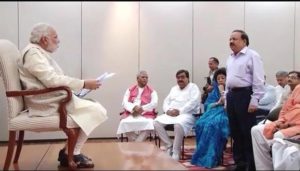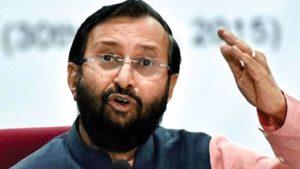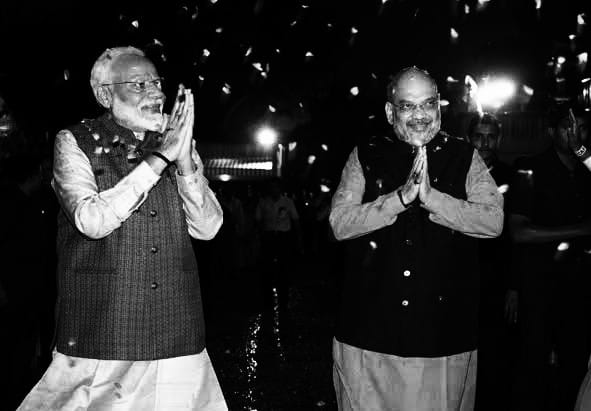Prime Minister Narendra Modi does not face the media. Autocrats do not need to face the media – especially when they act independently. Compare this with leaders of democracies across the world who frequently meet with the media and defend their actions. This indicates their capacity not only to operate as democratic leaders but also as a statement of their confidence. By this logic, Modi comes across as a leader unwilling to justify his decisions, a critical feature of a democratically elected leader.
The last time Modi faced a true journalist is when as Chief Minister of Gujarat he briefly appeared on Karan Thapar’s show. Unable to defend Thapar’s searching questions over his role in the Gujarat pogrom, Modi walked out. This indicates that somewhere deep within Modi’s conscience troubles him. And that he does not like that. It is possible this compels him as Prime Minister to adopt a masquerading approach: he tells people what to do, what to think, and how also to think of his government. If this is his public disposition, one can well imagine how his indoor official meetings are conducted.
 One leaked picture of a Union Cabinet meeting is particularly telling about Modi’s manner of conducting the office of the Prime Minister. In this picture from his first term, Modi is seen sitting on an elevated platform with all his Cabinet colleagues on a lower level. Each one of the Union Cabinet Ministers was required to stand up and address the Prime Minister when their turn came, just as a student behaves in a stern teacher’s class. Expectedly, this manner of treating his Union Cabinet colleagues drew sharp and widespread criticism, and an embarrassed Modi administration never repeated this Rashtriya Swayamsevak Sangh (RSS) Shakha manner of meeting.
One leaked picture of a Union Cabinet meeting is particularly telling about Modi’s manner of conducting the office of the Prime Minister. In this picture from his first term, Modi is seen sitting on an elevated platform with all his Cabinet colleagues on a lower level. Each one of the Union Cabinet Ministers was required to stand up and address the Prime Minister when their turn came, just as a student behaves in a stern teacher’s class. Expectedly, this manner of treating his Union Cabinet colleagues drew sharp and widespread criticism, and an embarrassed Modi administration never repeated this Rashtriya Swayamsevak Sangh (RSS) Shakha manner of meeting.
The style of communication of a political leader defines, in many ways, how she or he thinks and decides. In curating Modi’s public appearances, there has been a conscious effort to present him as a man with clear thinking and strong leadership. This is more than evident in his recent multiple appearances on TV about the COVID pandemic, when he asked people to behave in this manner and that. But when evidence of the catastrophic consequences of his decisions became apparent nation-wide, most strongly indicated by migrants walking hundreds of kilometers home in the desperate hope of some safety and security, and most importantly peace of mind not once did Modi speak in any of his speeches to their distressing condition which he had caused with his unplanned lockdown. Compassionate leadership appears to be anathema for Modi’s persona.
If this is how Modi speaks to millions who voted him to power for a second term, one can only imagine what his attitude is to those who cannot vote, but are impacted by his decisions – India’s biodiversity and environment. When we evaluate Modi’s performance on matters environmental in the first year of his second term, the answer is simple: he has become more disastrous to India’s environment and human rights than any PM before, including himself during his first term as PM.
Also Read: Turning back the clock: How the state is reversing gains made by traditional forest-dwelling communities
To get some perspective of why such harsh criticism is fair, let’s switch back to the first major policy decision Modi took when he became Prime Minister – this was to direct a comprehensive review of India’s environment, forest and biodiversity protection laws to identify bottlenecks for business, industrial and infrastructure growth. This task was undertaken in three months by a committee constituted under the chairmanship of TSR Subramanian. The Committee promoted recommendations articulated on the “principle of utmost good faith” in investors to do right. In simple terms, the recommendations wanted environmental regulatory institutions to not regulate investors and industrialists – instead trust them to do right and catch them if they did wrong. It’s like allowing a civil engineer to build a massive skyscraper without any requirement of architectural oversight or regulatory approvals, trusting all goes right. On the basis of such a principle, several ‘reforms’ were recommended to environmental, forest, and biodiversity laws to promote business interests.
Widespread condemnation of such ways of diluting environmental standards forced the shelving of the Subramanian report. However, environmental and forest laws continued to be systematically diluted by the Ministry of Environment, Forests, and Climate Change (MoEF&CC) employing its Executive powers, issuing Notifications and Circulars that privileged business interests over well-settled environmental norms and human rights standards. In a Parliament with a weak Opposition, there were hardly any questions raised about such systematic dilution, delivering a body blow to environmental safeguards and human rights.
It is not as though this is the first time environmental norms and laws have been diluted in India. Under Dr. Manmohan Singh’s UPA I administration, comprehensive dilutions of environmental regulations were undertaken with the introduction of Environment Impact Assessment Notification 2006. Peoples’ rights to involve meaningfully in environmental decision making were comprehensively whittled down, playing havoc in the lives of millions of natural resource-dependent and urban poor communities across India. As Jairam Ramesh who became Environment Minister in UPA II admitted, there was hardly any reason, compassion, and science in such environmental decisions of MoEF&CC. He admitted, in fact, that most of the Ministry’s decisions were suspect, even downright fraudulent and corrupt.

The distinctive difference in the nature of environmental decision making under Modi is that there is no effort to invested to explain, forget to apologise, for the widespread destabilisation caused in peoples’ lives and devastation of forests and ecologically sensitive areas due to business first policies adopted. Be it Environment Minister Prakash Javdekar, Transport Minister Nitin Gadkari, Defense Minister Rajnath Singh or anyone else from the Modi Cabinet, none care to justify their actions. Just as Modi does not. They merely state their intent and then lean on rhetoric to explain. Such didactic administrative approaches should not have any place in a parliamentary democracy.
It gets worse. When the entire nation was under lockdown, Environment Minister Prakash Javdekar issued a slew of clearances for mega projects involving massive felling of forests and irreversible destruction of ecologically sensitive areas in the Western Ghats and the Himalayas. He took these decisions on the basis of virtual meetings online which did not allow any of the members of the review committees to review documentation involved. The projects approved included clearing railway and road projects through thick jungles of Western Ghats and Himalayas, initiating steps for the construction of massive hydro projects across Karnataka’s over-dammed Sharavathi river, approving a mega-dam in Arunachal Pradesh which would destroy some of the state’s richest forests, recklessly and advancing road and rail expansion projects adversely impacting tens of villages and forests across India. To make such reckless clearances even easier, Javdekar now proposes to comprehensively amend the EIA Notification, unabashedly to advance corporate and investor interests over the critical need to protect India’s highly threatened forests and natural resources, and associated livelihoods.
When Dr. Harsh Vardhan was Environment Minister of India a couple of years ago, he had redrafted India’s Forest Policy was mooted which clearly sought to dilute, even defeat, the implementation of the historic Forest Rights Act which secures rights of tribals. Besides, it weakened the implementation of the Biodiversity Act and people’s sovereign rights to bioresources. The policy also proposed to privatise forests and promote corporate control over them, methods which would probably have shocked even the East India Company. Thankfully, the Parliament came to India’s rescue. On the basis of representation from Coalition for Environmental Justice in India, the Parliamentary Standing Committee on Environment and Forests reviewed the policy, found it to be against the rights of tribals and other forest dwellers, even found it to be destructive of forests, and sent it back to the Environment Ministry for review. It has not yet reappeared.

With the economy now in a tailspin given Narendra Modi’s hubristic, disastrous and unsuccessful lockdown to contain COVID, and the desperate need to generate revenue streams and jobs, we are already hearing grumblings from industry and corporate lobbies. They have particularly targeted environmental norms and labour laws, and want them to be diluted further. All this in the backdrop of the disaster in LG Polymers at Vizag which killed over a dozen and injured thousands with its toxic release – a disaster that is the direct consequence of weak regulation, the operation of the ‘principle of utmost good faith’ and of Modi’s penchant to take decisions without rationale and without appreciating its potentially disastrous consequences. An approach that emerges out of his constant attempt to project himself as a man who will deliver India from his specious, though popular, claim of ‘seven decades of non-development’. Despite such political posturing by Modi, India’s economic situation is grim now. It is more than likely now that the Modi administration will push for industrial and infrastructure growth at any cost. This will mean accelerated environmental destruction and social disruption, and at an unprecedented scale. Megaprojects will be recklessly pursued on the claim they will redeem India from the post-COVID economic downturn. All this may even be presented by Nirmala Sitharaman as part of the post COVID reboot India ‘package’.
Stopping this inhuman and environmentally disastrous push for industrial and infrastructure growth at any cost, which is only likely to be disastrous overall, is a Constitutional obligation we all have. We must not shirk from that as our quality of life and our livelihoods, and also those of generations to come, depends entirely on we succeed in resisting the environmentally disastrous plans of India’s Bolsonaro – which Modi is.
Leo F. Saldanha is a well known Environmental Activist and has been working relentlessly works advancing environmental and social justice, particularly of vulnerable communities.




[…] Read Next: A Year In Retrospect: Modi 2.1 Is Environmentally Disastrous […]